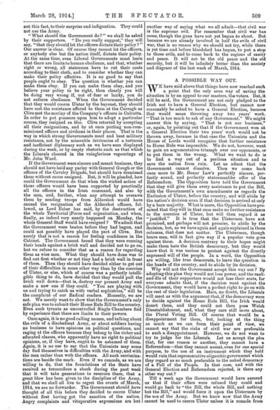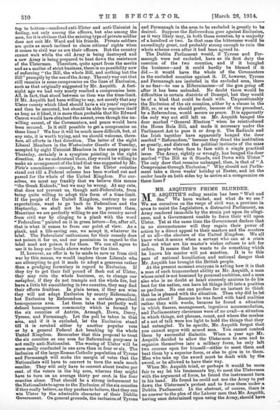A POSSIBLE WAY OUT.
WE have said above that things have now reached such a point that the only sane way of saving the situation is by an appeal to our masters, the voters. But, it will be said, the Government are not only pledged to the Irish not to have a General Election, but cannot now reasonably be asked to have a General Election, because that would mean throwing away two years' work. " That is too much to ask of any Government." We might answer this by saying, " That is not our business," or, again, by pointing out that if the Government won at a General Election their two years' work would not be thrown away, because in that case the Unionists and the House of Lords would recognize that further resistance to Home Rule was impossible. We do not, however, want to gain an argumentative triumph over our opponents, or to put them in the wrong. What we want to do is to find a way out of a perilous situation and to save the nation from ruin. Let us admit that the Government cannot dissolve. Then we come back once more to Mr. Boner Law's perfectly sincere, per- fectly sound, and perfectly statesmanlike offer of the Referendum. The Opposition have told the Government that they will give them every assistance to put the Bill, with the Government's own amendments as regards the Exclusion of Ulster, before the country, and will abide by the nation's decision even if that decision is arrived at only by a bare majority. What is more, the Opposition have pro- mised that they will in that case make no further resistance to the coercion of Ulster, but will then regard it as "justified." It is true that the Ulstermen have not promised, and perhaps will not promise, to abide by the decision, but, as we have again and again explained in these columns, that does not matter. The Ulstermen, though brave men, will in fact give way if a popular vote goes against them. A. decision contrary to their hopes might make them hate the British democracy, but they would know that it was useless to protest against the directly expressed will of the people. In a word, the Opposition are willing, like true democrats, to leave the question in the hands of the country, and to abide by its decision. Why will not the Government accept this way out ? By adopting this plan they would not lose power, and the rank- and-file of their supporters would not lose their seats, for everyone admits that, if the decision went against the Government, they would have a perfect right to go on with the rest of their legislation. Here, no doubt, the Liberals will meet us with the argument that, if the democracy were to decide against the Home Rule Bill, the Irish would desert them, and they could not then pass Welsh Disestablishment, and, what they care still more about, the Plural Voting Bill. Of course that would be a disappointment for them, but, looking at the thing as much as we can from their point of view, we cannot say that the risks of civil war are preferable to such a disappointment. However, we do not want to try to judge for the Liberals. Let us accept the plea that, for one reason or another, they cannot have a Referendum—that they cannot assent, even for one special purpose, to the use of an instrument which they hold would ruin that representative oligarchic government which they regard as so much preferable to the naked democracy of a Poll of the People. In that case, and with the General Election and Referendum rejected, is there any other way out ?
Till s week ago the Government would have assured us that if their offers were refused they could and would go back to "the Bill, the whole Bill, and nothing but the Bill," and would force it upon the Ulstermen by the use of the Army. But we know now that the Army cannot be used to coerce Mater unless it is remade from
fop to bottom—rendered anti-Ulster and anti-Unionist in feeling, not only among the officers, but also among the men, for it is obvious that the existing type of private soldier does not suit Mr. Ward and his friends. Private soldiers are quite as much inclined to claim citizens' rights when it comes to civil war as are their officers. But the country cannot wait while the old Army is being destroyed and a new Army is being prepared to beat down the resistance of the Ulstermen. Therefore, quite apart from the merits and as a matter of strict business, there is no possibility now of enforcing "the Bill, the whole Bill, and nothing but the Bill" promptly by the use of the Army. The only way out that still remains is some compromise on the lines of Exclusion, such as that originally suggested by Mr. Asquith. A fort- night ago we had very nearly reached a compromise here. All, in fact, that stood between us then was the time-limit. If Mr. Asquith bad been willing to say, not merely that any Ulster county which liked should have a six years' reprieve and then be executed, but should be able to reprieve itself as long as it liked, it is more than probable that Sir Edward Carson would have obtained the assent, even though the un- willing assent, of the Covenanters, and peace would have been secured. Is it still possible to get a compromise on these lines ? We fear it will be much more difficult, but, at any rate, it is worth trying, and we should welcome, there- fore, all efforts in that direction. The letter of the eight Liberal Members in the Westminster Gazette of Tuesday, accepted by eight Unionist Members in the same paper on Thursday, certainly is a symptom pointing in the right direction. As we understand them, they would be willing to make an arrangement of the kind that was suggested by Mr. Pirie's amendment—namely, to let the Ulster counties stand out till a Federal scheme has been worked out and passed for the whole of the United Kingdom. For our- selves, we must say frankly that we believe this means "the Greek Kalends," but we may be wrong. At any rate, that does not prevent us, though anti-Federalists, from being quite willing to adopt this form of a time-limit. If the people of the United Kingdom, contrary to our expectations, want to go back to Federalism and the Heptarchy, we shall not be able to prevent them. Meantime we are perfectly willing to see the country saved from civil war by clinging to a plank with the word "Federalism " painted on it in green letters—for, after all, that is what it comes to from our point of view. As a plank, and a life-saving one, we accept it, whatever its label. The Federalists' enthusiasm for their remedy does not poison it for us, and our pessimism in regard to the label need not poison it for them. We can all agree to use it to keep our heads above water for the time.
If, however, an offer is to be made to save us from civil war by this means, we would implore those Liberals who are attempting to get it made to adopt a generous rather than a grudging formulary in regard to Exclusion. If they try to get their full pound of flesh out of Ulster, they may ruin the whole business, or, to change our metaphor, if they do not trample out the whole fire, but leave a little bit smouldering in two counties, they may find their efforts fruitless. In plain terms, if they are wise they will not adopt Exclusion by county Referendum, but Exclusion by Referendum in a certain prescribed homogeneous area. Let them take that perfectly well defined homogeneous community which is formed by the six counties of Antrim, Armagh, Down, Derry, Tyrone, and Fermanagh. Let the poll be taken in that area, and if it is excluded, let the Exclusion stand till it is revoked either by another popular vote or by a general Federal Act breaking up the whole United Kingdom. Remember that this proposal to treat the six counties as one area for Referendum purposes is not really anti-Nationalist. The wooing of Ulster will be more easily conducted in one area than in four or six. The inclusion of the large Roman Catholic population of Tyrone and Fermanagh will make the margin of votes that the Nationalists will have to convert to turn the scale much smaller. They will only have to convert about twelve per cent. of the voters in the big area, whereas they might have to turn on an average thirty per cent. in the four counties alone. That should be a strong inducement to the Nationalists to agree to the Exclusion of the six counties if they really believe, as they profess to believe, that they can win Ulster by the admirable character of their Dublin Government. On general grounds, the inclusion of Tyrone and Fermanagh in the area to be excluded is greatly to be desired. Suppose the Referendum goes against Exclusion, as it very likely may, in both those counties, by a majority of a hundred or two. In that case the bitterness would be exceedingly great, and probably strong enough to ruin the whole scheme even after it had been agreed to. The Dublin Parliament would, if Tyrone and Fer- managh were not excluded, have as its first duty the coercion of the two counties, and if it bungled the business—and it could hardly be blamed if it did—it would have the whole of the Covenanters in the excluded counties against it. If, however, Tyrone and Fermanagh are included in the excluded area, there is no fear—to use a Hibernianism—of the gun going off after it has been unloaded. No doubt there would be difficulties in certain districts of Donegal, but they would be of a kind that could be dealt with. Unquestionably the Exclusion of the six counties, either by a clause in the Bill, or, or as we should prefer, because of the precedent, by a Referendum, would secure us peace. It is apparently the only way out still left us. Mr. Asquith banged the door marked "General Election" when he reintroduced the Home Rule Bill, and made it necessary under the Parliament Act to pass it or drop it. The Radicals and the Irish together have apparently hanged the door marked " Referendum," because they dread the institution so greatly, and distrust the political instincts of the mass of the people when face to face with a single practical issue. The Army, rightly or wrongly, has banged the door marked "The Bill as it Stands, and Down with Ulster." The only door that remains unbanged, then, is that of " A. Compromise through Exclusion." Why should not Parlia- ment take a three weeks' holiday at Easter, and let the cooler heads on both sides try to arrive at a compromise on these lines















































 Previous page
Previous page